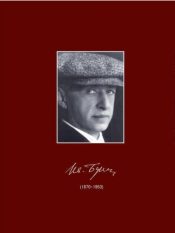
The Presidential Library’s collections portray Ivan Bunin
Today, October 22, 2019 marks the 149th anniversary of the birth of Ivan Bunin (1870–1953), a prose writer, poet, translator and Nobel Prize winner in literature in 1933. The Presidential Library’s portal provides a selection of memories of the writer and his work, including early Bunin’s poems and stories published on the pages of pre-revolutionary magazines, such as: “Novoye Slovo”, “Sovremenny Mir” and others.
Ivan Bunin was born in an old noble family. The father, who received a small inheritance, went bankrupt, so a three-year-old child from Voronezh was taken to a deaf farm in the Oryol province. “Here, in the deepest field silence, in the summer among the loaves approaching our very thresholds, and in the winter among the snowdrifts, I spent my childhood, full of sad and peculiar poetry”, - wrote Bunin in 1915 in his Autobiographical Note.
In his works, Bunin appears not only as one of the best Russian prose writers and poets, but also as a philosopher. Not all great writers were endowed with the ability to look into the future, warning mankind from oblivion of culture as the most precious thing that keeps a thousand-year history.
Having emigrated to France, Bunin continued to write only in Russian. The first collection of his works in the USSR was published in 1953.
The images of the village and the vanishing noble nests pass through all of Bunin's works, filling it with piercing nostalgia for the irrevocable past and emigrant longing for the Motherland, where he never returned.
When, finally, the Russian-speaking reader got familiar with the writer’s works, Bunin took his rightful place among the pillars of Russian literature: large volumes of his books began to appear, researchers of his literary heritage began to intensify. This fact is confirmed by the selection of dissertation abstracts, added the electronic collections of the Presidential Library, which reflect the writer's contribution to the national treasury of culture. Thus, for example, an electronic copy of the dissertation abstract by T. Skripnikova considers Spiritual and religious problems and its artistic embodiment in the “peasant prose” of Ivan Bunin. T. Zimina-Dyrda focuses on The poetics of color and light in the prose of Ivan. Bunin, P. A. Nilus and A. M. Fedorov. The theme associated with the image of the costume as one of the components of the Bunin art laboratory is revealed in an electronic copy of the abstract of the dissertation by Y. Popova “The language of clothes” in the work of Ivan Bunin: characterological and plot-forming functions.
Of particular interest is the electronic catalog album Ivan Bunin in Print (1897–2011), published in Voronezh - the city in which the future writer was born. It, in particular, illustrates how popular Bunin's works were not only in Russia but also abroad: “Russian refugees in the West did not forget about Bunin. His new books were sold not only in France, where he lived, but also in Germany, Belgium, and the USA. The first foreign book in the native language, the short story collection “The Scream” (Krik), appeared in the Slovo Danzig publishing house (1921). It was preceded by a piercingly written introduction where the author forever said goodbye to Russia dear to his heart”.
Ivan Bunin considered the October Revolution of 1917 to be the deepest crisis, analyzing already from abroad its causes.

